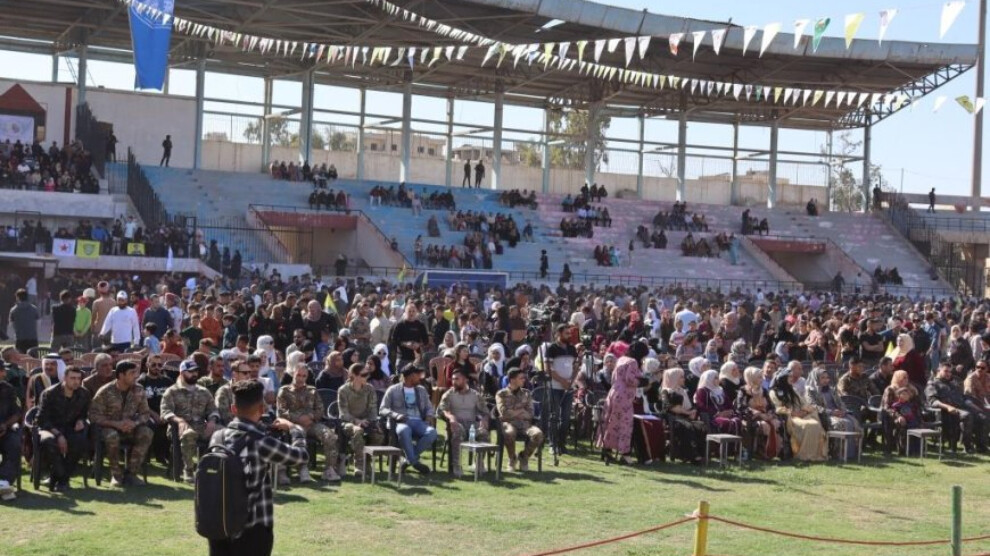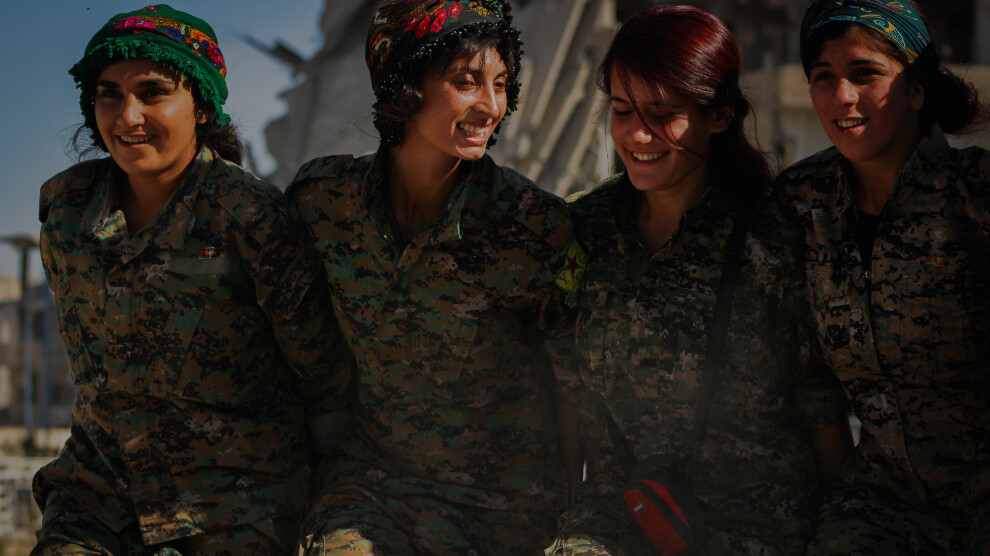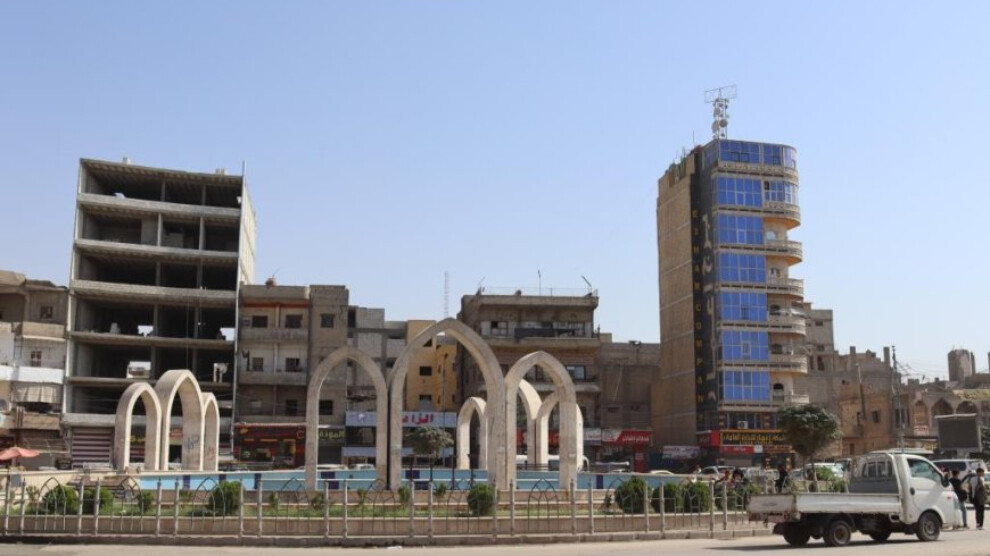At the celebration of the 7th anniversary of the liberation of Raqqa from ISIS gangs, Hisên Osman, Co-Chair of the Democratic Peoples' Assembly, said, “The Autonomous Administration draws its strength from the unity and support of the peoples.”

ANF
RAQQA
Sunday, 20 October 2024, 18:27
Raqqa was liberated from ISIS occupation 7 years ago. People's Defence Units (YPG), Women's Defence Units (YPJ) and Syrian Democratic Forces (SDF) announced on 20 October 2017 that they completely liberated the city, known as the capital of ISIS, from ISIS.
This important day was celebrated today with the slogan ‘We liberated our city in the spirit of our martyrs; we will continue our struggle until we destroy the occupation and achieve full freedom’.
For the celebration to commemorate this historic victory, the Municipal Stadium in Raqqa was decorated with posters of martyrs and flags of the SDF, YPG, YPJ, HPC and Internal Security Forces. The celebration was attended by Sîham Qeryo, Co-Chair of the Democratic Peoples Assembly of North and East Syria, Gabrîel Şemûn, Co-Chair of the Executive Council, Hisên Osman, Co-Chair of the Autonomous Administration Council, tribal leaders and opinion leaders, as well as representatives of the Future of Syria Party, Zenûbiya Women's Community, Raqqa Military Council and many people from the canton.
During the celebration, which started with a minute of silence, Hisên Osman, Co-Chair of the Democratic Peoples' Assembly of Nort and East Syria, addressed the crowd. Osman congratulated the 7th anniversary of the liberation of Raqqa and said, “This victory was won with the determination and free will of the people of North and East Syria and the SDF fighters. The fighters have become a symbol of resistance all over the world with their great struggle and sacrifice in this liberation operation.”
Osman emphasised that the Democratic Autonomous Administration is determined to protect the gains of the region and destroy the mercenary cells and said, “The Autonomous Administration draws its strength from the unity and support of the peoples. Social honour based on the principles of democratic nation and brotherhood of peoples is our common destiny. We will continue to develop our city, strengthen its security and protect its free identity.”
Osman thanked the people of Raqqa and added: “Our people joined the reconstruction work by uniting around the Autonomous Administration and gave great support.”
The celebration continued with speeches on behalf of the Zenubiya Women's Community and the Raqqa Military Council, and various cultural and artistic events.
Seven years ago, the liberation of Raqqa
Seven years ago, Raqqa was liberated from the hands of the Islamic State by the SDF and YPJ. A new life was built step by step on the ruins of the "capital of terror".

ANF
RAQQA
Sunday, 20 October 2024
Raqqa was the capital of the "ISIS caliphate" in Syria. Seven years ago, the jihadists' reign of terror collapsed. After a months-long and costly offensive to liberate the city, the Syrian Democratic Forces (SDF) raised their flags in Raqqa's stadium on 17 October 2017. The stadium was one of the terrorist militia's last strongholds: public executions and torture were carried out there. Two days later, the YPJ (Women's Defense Units), whose fighters had led the "Battle of Raqqa", announced the complete expulsion of ISIS in Al-Naim Square. But the jihadists left behind a devastated, mined city and a severely traumatized population.

The administration of the liberated Raqqa was handed over to a civil council. The body made Raqqa a diverse, multi-identity and multi-religious city again after almost four years of ISIS rule. In an interview with the Mezopotamya (MA) news agency, activist Emine Omar from the Women's Committee of the Autonomous Administration of Northern and Eastern Syria spoke about the years of reconstruction in Raqqa and what has changed in the lives of women as a result of this process.
Omar said: "Raqqa was of great strategic importance to the Islamic State. That is why it became the 'capital' of the ‘Caliphate’. Terror and attacks were part of everyday life and Raqqa quickly turned into a colorless and lifeless city. Both men and women wore black clothes. Women were forced to wear the hijab. It was not clear who was underneath this clothing. The aim was to deprive women of any identity."

Omar spoke about the controls on women by the ISIS's self-appointed morality police, the so-called Hisbah, and said: "On the street, women had no colour. Everything was black. Women were forced to marry ISIS mercenaries. Women who refused were punished. Universities and schools suddenly ceased to exist."
Omar described the destruction caused by ISIS in Raqqa: "The extent of the destruction caused in the more than three years of terror was unbelievable. When the self-government liberated the city, it had to deal with this devastation. It began to soothe the wounds from the ground up. Because ISIS had infiltrated every area of life. When Raqqa was liberated, the women made their victory clear by tearing off their black chadors. That was a symbolic moment. After the liberation, Raqqa shone again in the colors of life. Above all, Arab women who experienced and were subjected to the oppression of ISIS are now spreading the revolutionary understanding of Autonomous Administration. They are committed to defending women's rights in administrative structures and organizations and have founded a women's committee. Raqqa was once called the 'city of death'. But the struggle that the women of Raqqa waged after the liberation contributed significantly to breaking the fear of ISIS here."

Today, Raqqa is being rebuilt according to the paradigm of the Democratic Nation, added Emine Omar. The three core elements are democracy, women's liberation and social ecology. The practical reality of this theory and the dream of a revolution in which women are free and none of them are enslaved has led to great change in Raqqa. As a result, many women who fled the city under ISIS rule have returned to Raqqa. "With the Rojava revolution, women recognized themselves," says Omar, adding: "They took this self-awareness everywhere in their leadership role in the revolution, in their struggle and their organization, and thus also in the reconstruction of Raqqa. Today, women take their rights as a basis in all areas. Assyrian, Arab and Kurdish women founded their own organizations. These organizations are based on women's rights. The apoist philosophy of 'Jin Jiyan Azadî' has spread all over the world as the slogan of the women's revolution. That was a very important example. But the fight against the ISIS threat remains a key challenge - for us women, for Raqqa and for the entire autonomous region."
Seven years ago, Raqqa was liberated from the hands of the Islamic State by the SDF and YPJ. A new life was built step by step on the ruins of the "capital of terror".

ANF
RAQQA
Sunday, 20 October 2024
Raqqa was the capital of the "ISIS caliphate" in Syria. Seven years ago, the jihadists' reign of terror collapsed. After a months-long and costly offensive to liberate the city, the Syrian Democratic Forces (SDF) raised their flags in Raqqa's stadium on 17 October 2017. The stadium was one of the terrorist militia's last strongholds: public executions and torture were carried out there. Two days later, the YPJ (Women's Defense Units), whose fighters had led the "Battle of Raqqa", announced the complete expulsion of ISIS in Al-Naim Square. But the jihadists left behind a devastated, mined city and a severely traumatized population.

The administration of the liberated Raqqa was handed over to a civil council. The body made Raqqa a diverse, multi-identity and multi-religious city again after almost four years of ISIS rule. In an interview with the Mezopotamya (MA) news agency, activist Emine Omar from the Women's Committee of the Autonomous Administration of Northern and Eastern Syria spoke about the years of reconstruction in Raqqa and what has changed in the lives of women as a result of this process.
Omar said: "Raqqa was of great strategic importance to the Islamic State. That is why it became the 'capital' of the ‘Caliphate’. Terror and attacks were part of everyday life and Raqqa quickly turned into a colorless and lifeless city. Both men and women wore black clothes. Women were forced to wear the hijab. It was not clear who was underneath this clothing. The aim was to deprive women of any identity."

Omar spoke about the controls on women by the ISIS's self-appointed morality police, the so-called Hisbah, and said: "On the street, women had no colour. Everything was black. Women were forced to marry ISIS mercenaries. Women who refused were punished. Universities and schools suddenly ceased to exist."
Omar described the destruction caused by ISIS in Raqqa: "The extent of the destruction caused in the more than three years of terror was unbelievable. When the self-government liberated the city, it had to deal with this devastation. It began to soothe the wounds from the ground up. Because ISIS had infiltrated every area of life. When Raqqa was liberated, the women made their victory clear by tearing off their black chadors. That was a symbolic moment. After the liberation, Raqqa shone again in the colors of life. Above all, Arab women who experienced and were subjected to the oppression of ISIS are now spreading the revolutionary understanding of Autonomous Administration. They are committed to defending women's rights in administrative structures and organizations and have founded a women's committee. Raqqa was once called the 'city of death'. But the struggle that the women of Raqqa waged after the liberation contributed significantly to breaking the fear of ISIS here."

Today, Raqqa is being rebuilt according to the paradigm of the Democratic Nation, added Emine Omar. The three core elements are democracy, women's liberation and social ecology. The practical reality of this theory and the dream of a revolution in which women are free and none of them are enslaved has led to great change in Raqqa. As a result, many women who fled the city under ISIS rule have returned to Raqqa. "With the Rojava revolution, women recognized themselves," says Omar, adding: "They took this self-awareness everywhere in their leadership role in the revolution, in their struggle and their organization, and thus also in the reconstruction of Raqqa. Today, women take their rights as a basis in all areas. Assyrian, Arab and Kurdish women founded their own organizations. These organizations are based on women's rights. The apoist philosophy of 'Jin Jiyan Azadî' has spread all over the world as the slogan of the women's revolution. That was a very important example. But the fight against the ISIS threat remains a key challenge - for us women, for Raqqa and for the entire autonomous region."
No comments:
Post a Comment